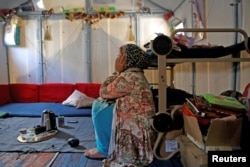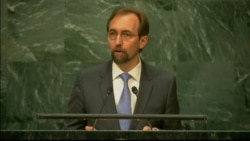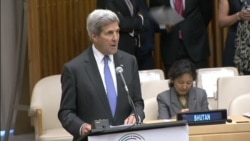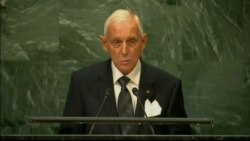The international community has pledged to improve its response to the global refugee and migration crisis, though some question whether the plan goes far enough.
At a high-level summit Monday at the United Nations, member states agreed to protect the rights of refugees and migrants and to share responsibility for large movements of people on a global scale.
"Refugees and migrants are not to be seen a burden; they offer great potential, if only we unlock it," U.N. Secretary-General Ban Ki-moon told the assembly. "We must place the human rights of all refugees and migrants at the heart of our commitments."
An unprecedented 65 million people have been forcibly displaced across the planet, some by conflict or persecution, others by extreme poverty, and many by natural disasters.
The declaration adopted in New York seeks to increase support to countries most affected by the crisis, to help displaced children get access to education and to boost humanitarian funding and the resettlement of refugees.
A plan to ask governments to resettle 10 percent of the world’s refugees each year was dropped and the final declaration has no requirement that countries take specific numbers of people, which has led to criticisms, especially from NGOs.
Human Rights Watch said the declaration is a “missed opportunity” to widen the scope of refugee and migrant protections, asserting it "limits expectations for concrete, new commitments."
Nobel laureate and youth advocate Malala Yousafzai also expressed skepticism that the summit would make any tangible progress for refugees, especially displaced children.
“Let's not be fooled by what we heard at the United Nations today; focus on what we did not hear,” she said in a statement. “The declaration does not include any new, substantive commitments for refugees.” She said the world’s refugee children “were hoping for more. They deserve more.”
Unwelcome
From the time I arrived in the Netherlands I saw how even Europe is struggling,” Syrian refugee Mohammed Badran told the assembly. “As young refugees we face this anger and fear every day. Doors are closed to us, higher education is denied to us. We are often dismissed, not taken seriously and underestimated,” he said.
The U.N. is placing more emphasis on fighting discrimination and xenophobia relating to refugees and migrants as countries close their borders to the growing human exodus.
U.N. Human Rights Commissioner Zeid al-Hussein was especially forceful, telling leaders that in too many countries positive voices are being replaced by “race-baiting bigots, who seek to gain, or retain, power by wielding prejudice and deceit, at the expense of those most vulnerable — and, ultimately, even those who support them initially.”
He warned that some of the “bigots and deceivers” who oppose greater responsibility-sharing and promote divisions may well be in this hall. “If you are here, we say to you: We will continue to name you publicly. You may soon walk away from this hall. But not from the broader judgement of "we the people", all the world's people — not from us.”
US to Host Second Summit
U.S. Secretary of State John Kerry said the Leaders’ summit that President Barack Obama is chairing Tuesday on the sidelines of the General Assembly seeks to complement and reinforce the U.N. meeting.
“The world knows what it must do to respond effectively to the massive challenge that we face,” Kerry said. “But we have to apply knowledge systematically, and we need the resources to do it before it is too late.”
Tuesday’s conference will focus on increasing refugee financing, doubling the global number of resettled refugees through legal channels, and expanding work and education opportunities for them. A pledge is required for governments to participate in the meeting.
Kerry noted that the United States remains the world’s largest donor of humanitarian assistance and refugee relief and has resettled more refugees through the United Nations refugee agency resettlement program than all other nations combined.
“We are determined to work with all you to create more opportunities for refugees,” he said.
IOM joins UN system
In an effort to make the U.N. response to the refugee and migration crisis more effective, the International Organization for Migration officially joined the U.N. family on Monday.
The agency, which has more than 10,000 staffers working on five continents, will bring its expertise to the crisis.
“Migration is inevitable in this century,” IOM chief William Lacy Swing said. “[It is] necessary if our economies and societies are to flourish, and highly desirable if we have responsible and humane migration polices.”
He said the “toxic public narrative on migration” must be changed.










